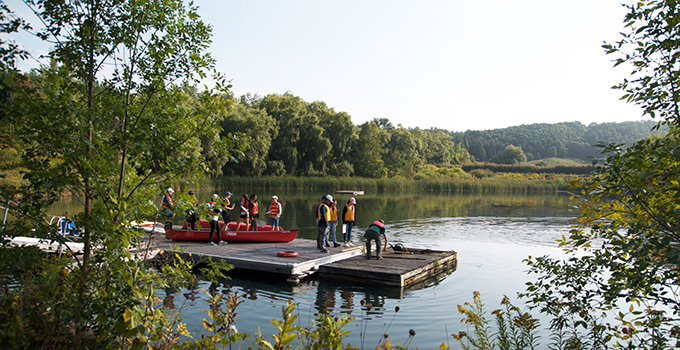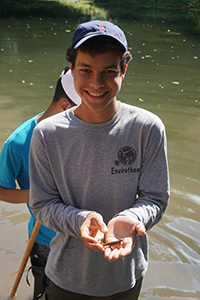A Field Trip to the Koffler Scientific Reserve

During a field trip to U of T’s Koffler Scientific Reserve (KSR), students in the Butterfield Environment & Sustainability Stream of the Margaret MacMillan Trinity One program had the opportunity to experience first-hand the work of a Conservation Biologist. As part of the TRN141 – Pathways to Sustainability course, students helped initiate the first turtle mark-and-recapture study at KSR. Located north of Toronto in the Oak Ridges Moraine, the Koffler Scientific Reserve is recognized for its cutting-edge research and education in biodiversity, ecology, and conservation biology.

With the help of Patrick Moldowan, a herpetologist, avid naturalist and PhD candidate at U of T, students learned how reptile and amphibian populations in southern Ontario are threatened by human development, especially highways.
While at KSR, students were taught how to safely handle and rescue turtles, as well as how take measurements, identify local turtle species and note scientific observations in the field. During paddles on the ponds, Patrick Moldowan discussed the intersections of biodiversity conservation with law, economics, genetics and human health. Students also had hands-on experience identifying frogs, newts and aquatic insects.
The Butterfield Environment & Sustainability Stream will continue to allow our students to monitor the turtles that call KSR home year-after-year, helping us learn more about how to protect these valuable creatures.
Visit our Facebook page to see more photos from our students’ trip to the Koffler Scientific Reserve.
About the Butterfield Environment & Sustainability Stream
Launched thanks to a generous donation by Trinity alumni Martha and George Butterfield, this stream in the Margaret MacMillan Trinity One program examines the most challenging issues surround the environment and sustainability. Students learn how to think about the complexities of environmental sustainability from both theoretical and scientific perspectives, as well as studying the ethical issues arising from the way humans interact with nature.
About TRN141 – Pathways to Sustainability
Part of the Butterfield Environment & Sustainability Stream in the Margaret MacMillan Trinity One program, TRN141 introduces students to fundamental issues in environmental science with a multi-disciplinary focus on human impacts on physical and biological systems, and on identifying pathways to sustainability. Key themes include energy and resources, climate change, land use, contaminants and protecting biodiversity in the context of the Anthropocene. The course challenges students to apply the scientific method to environmental monitoring, research and problem solving through project design, data collection and analysis. The course also emphases information literacy, skills to distinguish science from pseudo-science, and considerations around representation of environmental science in the media.
Categories: Academic; Arts & Science; Student News; Sustainability; Trinity One


